Chemo During Pregnancy Did Not Affect Early Child Development
Children exposed to their mother’s cancer and cancer treatment did not appear to have cardiac, cognitive, or general developmental issues up to 36 months of age.
Image © nattanan726 / Shutterstock.com

Children exposed to their mother’s cancer and cancer treatment did not appear to have cardiac, cognitive, or general developmental issues up to 36 months of age, according to a new study published in the New England Journal of Medicine.
The study results were also presented at the 2015 European Cancer Congress (ECC), in Vienna, by study author Frédéric Amant, MD, a gynecologic oncologist at the University Hospitals Leuven in Belgium.
The data show that “termination of pregnancy is not necessary, that maternal cancer treatment is possible, and that this treatment offers the potential to prolong the pregnancy and avoid prematurity and its short and long-term complications,” Amant told Cancer Network.
The researchers enrolled 129 children from the Czech Republic, Italy, the Netherlands, and Belgium and were matched with 129 children born to mothers with no complications during pregnancy. All children were evaluated at a median age of 22 months.
The median maternal age at the time of cancer diagnosis was 33.4 and the median gestational age was 17.7 weeks. During the pregnancy, 96 children (74.4%) were exposed to chemotherapy, either alone or in combination with other treatments. The patients were exposed to between 1 and 10 cycles of chemotherapy.
Children of mothers diagnosed with cancer were born slightly premature whether or not the mother was treated for her cancer-median gestational age was 36 weeks, with 79 children (61.2%) born preterm. But, according to Amant, this was mostly due to induction of labor rather than spontaneous labor. The normal range of preterm births among the countries taking part in the study is 6.8% to 8%.
Children that were relatively small for their gestational age were more likely to be born to mothers with cancer during pregnancy compared to children in the control group (22% vs 15.2%), but this difference was not statistically significant.
A prior smaller case-control study by the same authors, presented last year at the European Society for Medical Oncology 2014 Congress, also showed that chemotherapy did not negatively affect cardiac function nor mental development of children born to mothers diagnosed with cancer during their pregnancy.
“The reassuring outcome may be explained by the timing of chemotherapy administration and the role of the placenta,” wrote the study authors in their discussion. “All cycles of chemotherapy in this series were administered after the first trimester of pregnancy. The period before a gestational age of 10 weeks is the most vulnerable, since organogenesis is occurring during this period. Administration of chemotherapy after the first trimester does not result in an increased rate or additional types of congenital malformations.”
Amant and his colleagues now want to enlarge the cohort and follow these children until age 18.